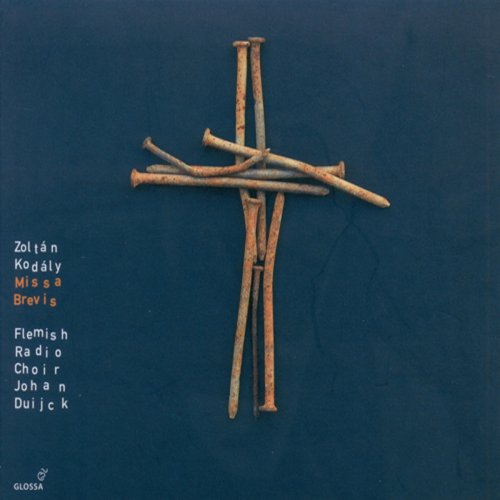
Flemish Radio Choir - Kodaly, Z.: Missa Brevis / Geneva Psalm 121 / Geneva Psalm 114 / Jesus and the Traders / Transylvanian Lament (2006)
BAND/ARTIST: Flemish Radio Choir, Johan Duijck
- Title: Kodaly, Z.: Missa Brevis / Geneva Psalm 121 / Geneva Psalm 114 / Jesus and the Traders / Transylvanian Lament
- Year Of Release: 2006
- Label: Glossa
- Genre: Classical
- Quality: FLAC (tracks)
- Total Time: 56:14 min
- Total Size: 272 MB
- WebSite: Album Preview
Tracklist:
01. Introitus
02. Kyrie
03. Gloria
04. Credo
05. Sanctus
06. Benedictus
07. Agnus Dei
08. Ite, missa est
09. A 121. genfi szoltar (Geneva Psalm 121)
10. A 114. genfi zsoltar (Geneva Psalm 114)
11. Jezus es a kufarok (Jesus and the traders)
12. Szekely keserves (Transylvanian Lament) (version for choir and piano)
13. Szekely keserves (Transylvanian lament)
14. The Music Makers, an Ode
15. Norveg leanyok (Norwegian girls)
01. Introitus
02. Kyrie
03. Gloria
04. Credo
05. Sanctus
06. Benedictus
07. Agnus Dei
08. Ite, missa est
09. A 121. genfi szoltar (Geneva Psalm 121)
10. A 114. genfi zsoltar (Geneva Psalm 114)
11. Jezus es a kufarok (Jesus and the traders)
12. Szekely keserves (Transylvanian Lament) (version for choir and piano)
13. Szekely keserves (Transylvanian lament)
14. The Music Makers, an Ode
15. Norveg leanyok (Norwegian girls)
All the conductors who have worked with the Flemish Radio Choir, or VRK, have no hesitation in ranking it alongside the other two great European chamber choirs, Accentus and the RIAS Kammerchor. Its technical confidence, expressive capacity and profound knowledge of the repertoires, as well as its enormous vision and originality in putting together its programmes, are the key factors that have led to the inclusion of this elite group in Glossa’s selection of artists. Apart from the regular work with its Belgian conductor Johan Duijck, there are already plans for concerts and recordings with maestros such as Paul Hillier and Hervé Niquet, in what will be, indeed already is, a new and fascinating line for our label.
Composed during the Second World War (most of it at a Budapest monastery) and completed in 1944, Missa Brevis was first performed in 1945, just after the end of the war, at the Budapest Opera House (where Kodály and his wife had been forced to seek refuge during the final days of the conflict). It is one of his most notable choral pieces with accompaniment and subliminally conveys the suffering and uncertainty of that endless time during which Kodály risked his own life on more than one occasion. While all of this certainly helps to explain its powerful emotional and intensely dramatic qualities, more than anything else Missa Brevis is a hymn to hope, a musical poem of extraordinary transparency written in praise not only of the divinity that governs the destiny of humanity and nations but also, rooted as ever in the popular, of religious feeling, as manifested in believers for comfort and strength in the most difficult of circumstances.
Kodály: “Our age of mechanisation leads along a road ending with man himself a machine: only the spirit of singing can save us from this fate.” With its vigorous lyricism, its vibrant intonation, but also its alternation between restraint and jubilation, the Missa Brevis is a formidable exercise in sonorous refinement, an amalgam of singularly rich and sensitive musical impressions, a source of constant enjoyment for any listener who demands of a composition not so much the somewhat banal power of relaxation but rather the momentary suspension of the “world’s prose”...
Composed during the Second World War (most of it at a Budapest monastery) and completed in 1944, Missa Brevis was first performed in 1945, just after the end of the war, at the Budapest Opera House (where Kodály and his wife had been forced to seek refuge during the final days of the conflict). It is one of his most notable choral pieces with accompaniment and subliminally conveys the suffering and uncertainty of that endless time during which Kodály risked his own life on more than one occasion. While all of this certainly helps to explain its powerful emotional and intensely dramatic qualities, more than anything else Missa Brevis is a hymn to hope, a musical poem of extraordinary transparency written in praise not only of the divinity that governs the destiny of humanity and nations but also, rooted as ever in the popular, of religious feeling, as manifested in believers for comfort and strength in the most difficult of circumstances.
Kodály: “Our age of mechanisation leads along a road ending with man himself a machine: only the spirit of singing can save us from this fate.” With its vigorous lyricism, its vibrant intonation, but also its alternation between restraint and jubilation, the Missa Brevis is a formidable exercise in sonorous refinement, an amalgam of singularly rich and sensitive musical impressions, a source of constant enjoyment for any listener who demands of a composition not so much the somewhat banal power of relaxation but rather the momentary suspension of the “world’s prose”...
As a ISRA.CLOUD's PREMIUM member you will have the following benefits:
- Unlimited high speed downloads
- Download directly without waiting time
- Unlimited parallel downloads
- Support for download accelerators
- No advertising
- Resume broken downloads


